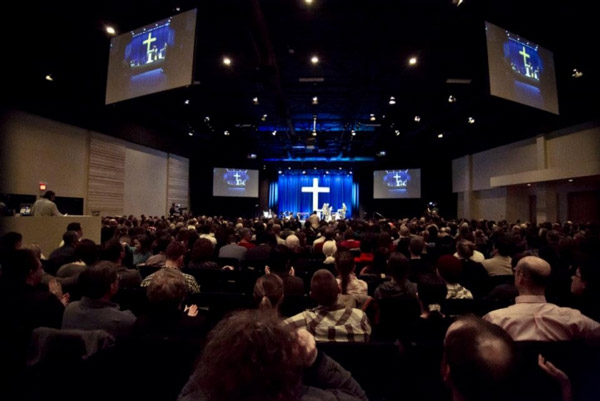The latest news in the unfurling of Seattle’s Mars Hill Church is particularly relevant for people who are planting and leading new churches. Much has already been written about Driscoll’s limitations and missteps in leadership, and their portents for similar leaders and congregations. But this step by Mars Hill’s leadership may be a positive sign about the future of the Church, and thus ought to be applauded.
To Mars Hill’s credit, by dissolving their multi-site model hoping to nurture their satellite campuses into sustainable, autonomous congregations, the mega church is taking a small step toward the sort of locally embodied expressions of faith that are the future of the Church. As the cultural prowess of Christianity wanes in America, local and contextualized expressions of the faith are going to become increasingly normative. We’re moving toward a church culture that will value smaller congregations which authentically represent the Church in their respective contexts.
Younger generations are hungry for authenticity, and that hunger is being met less and less by brand-name driven forms of consumer Christianity. We don’t want a relationship with a preacher we see on a video-screen. We want such authentic and intimate connections with sisters and brothers in Christ that we naturally “rejoice with those who rejoice and mourn with those who mourn” (Romans 12:15). We know this connection is ecclesial – that it means we belong to Christ, and thus to the Church, and thus to each other. And we want to experience that belonging in up close and personal ways. More importantly, we’re sent by Christ to proclaim his love in a frantic and fragmented society that is hungry for real relationship.
To that end, it’s significant that Dave Bruskas framed his announcement of the dissolution of Mars Hill in terms of mission. The letter begins by stating that Mars Hill’s mission “has always been clear – to make disciples and plant churches.” I think this is more than an attempt to put a positive spin on an otherwise negative situation. It takes humility on the part of an organization’s leaders to admit that they cannot sustain a personality-driven ministry after a senior leader’s collapse. It is a sign of wisdom, however, to connect the future of a fragmenting institution to the advancement of the Gospel. The denomination to which I belong says in its Book of Order that the Church is called to participate in Christ’s mission “even at the risk of losing its life.” From the death of Mars Hill, many new expressions of Church may be raised up which invite even more new people into the Kingdom of God.
The official letter which details these changes makes it clear that Mars Hill thinks the changes will happen quickly. I know little about the individual cultures of Mars Hill’s satellites, but this may be where their good intentions will run up against tremendous challenges. By giving the “local elder teams” only two months to discern whether their campuses will become independent congregations, merge with other churches, or disband altogether, Mars Hill may force its satellites to make hasty decisions out of anxiety rather than attentiveness.
For these new churches to thrive, they will have to listen attentively both to God and to the people to whom God sends them. The listening that results in the formation of enduring Christian communities in their respective contexts takes time. A lot of time. A friend who’s planting a missional community in Wyoming told me that her leaders spent nine months working through a guided discernment process “before being ready even to experiment in this work.”
Rather than springing up organically, these new communities which are birthed out of Mars Hill will have the inherited weight of their previous identity, which could cloud their vision of how God’s calling them to move forward. That means their discernment process will be even messier, and it will take longer than two months for God’s desired future for these congregations to emerge. Consider also the internal pastoral care that will need to be provided for members who are disaffected by the controversy and changes, and it becomes clear that the process will be long and arduous.
To stay focused during the coming months, the leaders of each local expression of what was Mars Hill Church would do well to keep framing their decisions and actions in terms of their mission, as Bruska did in his announcement. By steering their conversations toward outward expressions of mission, these new communities can find a renewed unity in a common calling to connect with people who are presently outside the Church. In so doing, they may also avoid the entropy that could engulf them should they linger long upon the wounds of the past.
May the Lord grant the leaders of Mars Hill’s new congregations great patience and wisdom, that they would listen attentively both to the Holy Spirit and to the neighborhoods where the Lord has called them to be the Church.
The Rev. Christopher Brown (MDiv, 2008) is the coordinator of the Church Planting Initiative at Pittsburgh Theological Seminary and co-pastor of The Upper Room Presbyterian Church, a church plant in Pittsburgh’ Squirrel Hill neighborhood.

